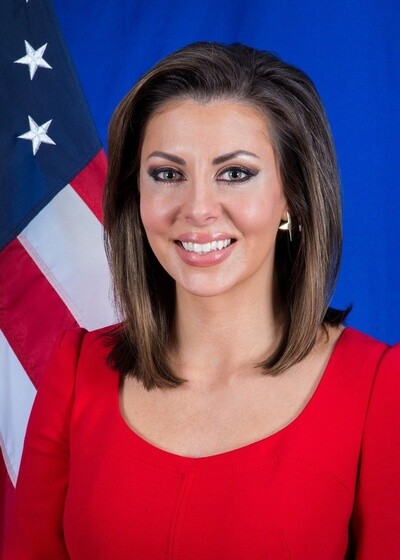hankyoreh
Links to other country sites 다른 나라 사이트 링크
US reiterates goal of N. Korea’s complete denuclearization

The final objective of North Korean denuclearization is the complete elimination of weapons of mass destruction (WMD), with a nuclear freeze marking only the “beginning,” the US State Department said on July 9.
Responding to a question on the US’ “final destination” in terms of North Korea’s denuclearization at a briefing that day, State Department Spokesperson Morgan Ortagus said, “I don’t think anything has changed.”
“We obviously clearly want to see the complete elimination of WMDs in North Korea,” she added.
Ortagus went on to say that a freeze “would never be the resolution of a process.”
“That [is] something that we would certainly hope to see at the beginning,” she said.
“I don’t think that the administration has ever characterized a freeze as being the end goal. That [. . . ] would be at the beginning of the process,” she emphasized.
Her remarks were a clear rejection of recent speculation from some quarters that the Donald Trump administration is attempting to abandon its goal of North Korea’s complete denuclearization in favor of contenting itself with a nuclear freeze. The confusion was stirred up with a New York Times report on June 30 stating that the administration was preparing a negotiation plan focused on nuclear freeze. State Department Special Representative for North Korea Stephen Biegun denied the claim at the time, calling it “pure speculation.” In remarks to reporters late last month, Biegun said a comprehensive agreement would need to be reached with Pyongyang on three things, namely a WMD freeze, a definition of the “end state” for denuclearization, and a road map – indicating that a freeze would only mark the entrance to that road map.
Ortagus reiterated that she had “no announcements” on whether Biegun – who is currently in Europe from July 8 to 11 – would be meeting with North Korean officials. Biegun and South Korean Ministry of Foreign Affairs Special Representative for Korean Peninsula Peace and Security Affairs Lee Do-hoon were scheduled to meet in Berlin on July 11 to begin prior coordination for working-level North Korea-US talks expected to take place around the middle of the month.
Referring to the meeting between Trump and North Korean leader Kim Jong-un on June 30, Ortagus said, “It wasn’t a summit, it wasn’t a negotiation; it was a meeting of two leaders.” Her remarks indicate that the US administration is not viewing the encounter as the third North Korea-US summit.
The State Department further announced that Assistant Secretary of State for the Bureau of East Asian and Pacific Affairs David Stilwell would be visiting the four Asian countries of South Korea, Japan, the Philippines, and Thailand from July 10 to 21. The trip, which is Stilwell’s first overseas visit since taking over his post, is seen as intended chiefly as an occasion for introductions.
According to the State Department, Stilwell plans to meet senior Blue House and Ministry of Foreign Affairs officials in Seoul on July 17 to discuss ideas for strengthening the South Korea-US alliance and increasing bilateral cooperation in the Indo-Pacific region. On July 11–14, he is to meet with senior officials from the Japanese Foreign Ministry, Defense Ministry, and National Security Council. He will also be visiting Manila with Assistant Secretary of Defense for Asian and Pacific Security Affairs Randall Schriver on July 15–16 and meeting with officials from the Thai Ministry of Foreign Affairs and Office of the Prime Minister in Bangkok on July 18–19, the State Department said.
By Hwang Joon-bum, Washington correspondent
Please direct comments or questions to [english@hani.co.kr]

Editorial・opinion
![[Guest essay] Amending the Constitution is Yoon’s key to leaving office in public’s good graces [Guest essay] Amending the Constitution is Yoon’s key to leaving office in public’s good graces](https://flexible.img.hani.co.kr/flexible/normal/500/300/imgdb/original/2024/0416/8917132552387962.jpg) [Guest essay] Amending the Constitution is Yoon’s key to leaving office in public’s good graces
[Guest essay] Amending the Constitution is Yoon’s key to leaving office in public’s good graces![[Editorial] 10 years on, lessons of Sewol tragedy must never be forgotten [Editorial] 10 years on, lessons of Sewol tragedy must never be forgotten](https://flexible.img.hani.co.kr/flexible/normal/500/300/imgdb/original/2024/0416/8317132536568958.jpg) [Editorial] 10 years on, lessons of Sewol tragedy must never be forgotten
[Editorial] 10 years on, lessons of Sewol tragedy must never be forgotten- [Column] A death blow to Korea’s prosecutor politics
- [Correspondent’s column] The US and the end of Japanese pacifism
- [Guest essay] How Korea turned its trainee doctors into monsters
- [Guest essay] As someone who helped forge Seoul-Moscow ties, their status today troubles me
- [Editorial] Koreans sent a loud and clear message to Yoon
- [Column] In Korea’s midterm elections, it’s time for accountability
- [Guest essay] At only 26, I’ve seen 4 wars in my home of Gaza
- [Column] Syngman Rhee’s bloody legacy in Jeju
Most viewed articles
- 1[Guest essay] How Korea turned its trainee doctors into monsters
- 2[Column] A death blow to Korea’s prosecutor politics
- 3[News analysis] Watershed augmentation of US-Japan alliance to put Korea’s diplomacy to the test
- 4‘National emergency’: Why Korean voters handed 192 seats to opposition parties
- 5[Photo] Cho Kuk and company march on prosecutors’ office for probe into first lady
- 6Exchange rate, oil prices, inflation: Can Korea overcome an economic triple whammy?
- 7After Iran’s attack, can the US stop Israel from starting a regional war?
- 8US grants Samsung up to $6.4B in subsidies for its chip investments there
- 9[Guest essay] Amending the Constitution is Yoon’s key to leaving office in public’s good graces
- 10Student made first call for rescue from sinking Sewol ferry